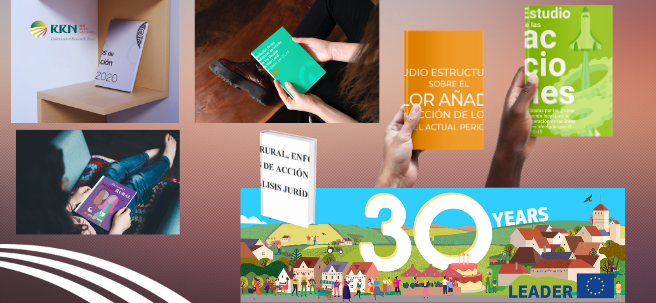
26 de April de 2021
Dinamización rural
26.04.2021. Thirty years are nothing. And they are everything at once. LEADER celebrates its 30th anniversary: March 1991 - March 2021. The European LEADER initiative was created to combat rural depopulation by diversifying the economy through the active participation of the interested population, businesses, associations, and the administration of the beneficiary rural areas. In short, local stakeholders were protected and empowered to act within their sphere.
- LEADER studies cover various topics relevant to its scope: women, cooperation, the legal framework, statistics, and local actions during the pandemic.
- The publication is part of the agreements signed with each of the national networks of Local Action Groups, REDR and REDER.
This participation was channeled through the Local Action Groups (LAG) , which have been responsible for the design and implementation of Rural Development Programs at the regional level.
To commemorate this celebration, the National Rural Network (RRN) has published a series of studies on LEADER covering various topics under its umbrella.
Publications
As part of the agreements that the General Directorate of Rural Development, Innovation and Agri-Food Training signs annually with each of the national networks of Local Action Groups - REDR (Spanish Rural Development Network) and REDER (State Rural Development Network) - the following studies have been carried out:
- “Compilation of relevant statistics on Local Action Groups” : This is a quantitative overview of the impact of LEADER on rural areas in Spain during the last programming period, 2014-2020, with tables, figures and data compiled based on the responses of 105 LEADER groups.
- “Structured study on the added value of Local Action Groups in the current period. Added value of LEADER in the territory”: a formulative and descriptive study on the added value of the LEADER methodology, developed with the involvement of experts from regional networks, local action groups, representatives of civil society, organizations, local administrations, and the instrumental business sector through various articles , interviews, and questionnaires . These articles and interviews reveal the hidden reality of the territories and highlight local uniqueness and their relationship with a specific social, cultural, and moral order, latent and alive in rural areas.
- "Study of the actions carried out by Local Action Groups for the recovery of rural areas affected by COVID-19": a publication that compiles initiatives launched in several rural areas of Spain during the worst moments of the health crisis caused by the pandemic. Specifically, we find more than fifty projects conceived by Local Action Groups that are an example of perseverance, resilience, and commitment to the region, and a demonstration of what LEADER is capable of achieving for the benefit of people, its ultimate beneficiaries. These projects also demonstrate the essential work of LEADER groups on the ground, capable of adapting to any situation, no matter how serious.
- “LEADER Cooperation Landscape 2014-2020 ”: a compilation of LEADER cooperation projects from several Spanish autonomous communities that includes a selection of good practices jointly implemented by different Local Action Groups during the period 2014-2020.
- "Women in GAL and Rural Environments": What is the current situation for rural women in Spain? This work captures the current reality of women through data analysis and a presentation of different testimonies of real experiences. The methodology used is based on the results of a
A survey was conducted among Local Action Groups (LAGs) across Spain. The survey's objectives sought, among other things, to measure the presence of women in LAG management and decision-making bodies. It also sought to quantify the presence and participation of women in businesses created through projects approved by LAGs with EAFRD funding during the period 2014-2020.
- “Rural Development. LEADER Approach and Local Action Groups. Legal Analysis”: A study conducted by REDER (State Network for Rural Development) and the General Foundation of the University of Burgos, which analyzes the legal status of the LEADER methodology in the different autonomous communities. The objective of the publication is to develop a proposal capable of harmonizing and standardizing the legal framework of LEADER for the next programming period, identifying and analyzing the most uncertain or problematic aspects. The final conclusion highlights the need for legal harmonization to provide security and strength to this methodology in all autonomous communities.
You can consult these publications through the following link .









